' ' '
Artist Spotlight
It is a rare treat to welcome part of the team behind our most recent Best Picture Winner; Conexão com o Mal (or ‘Evil Connection’). Joining us from Brazil; Director Daniel Maciel, thank you for assembling everyone!
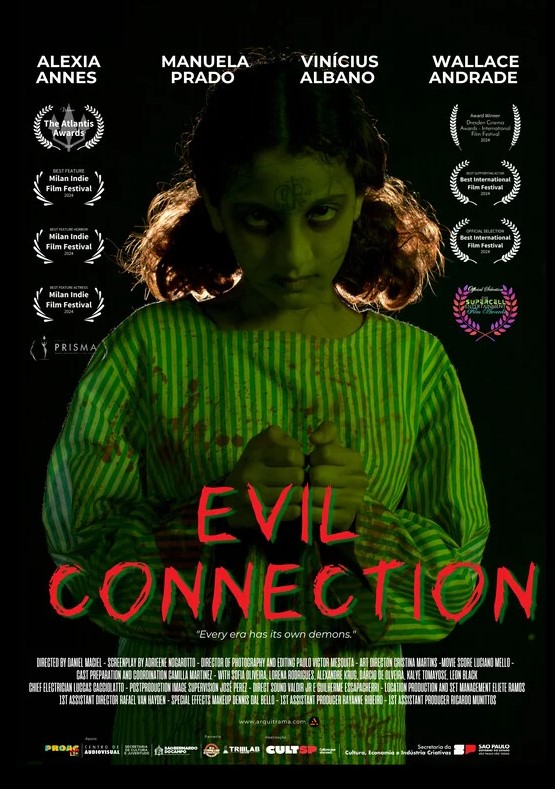
Tell us a about yourself, growing up and your passions.
DANIEL MACIEL (Director / Producer) – I was born in Minas Gerais, Brazil, and my path to filmmaking wasn’t easy. Although I couldn’t study cinema initially, I pursued Social Sciences, which provided me with a strong intellectual foundation. Later, I completed a master’s in screenwriting and became a professor of screenwriting in Brazil.
During the pandemic, I faced significant health challenges, including two retinal detachments and partial hearing loss. These experiences gave me a deep fear of losing my vision completely, but they also pushed me to fully dedicate myself to filmmaking. It was during this time that Evil Connection was born. Despite the challenges, I embraced my passion for storytelling, and today, I’m proud of what we’ve achieved.
I believe that adversity often fuels creativity, and my personal experiences have shaped the stories I want to tell.
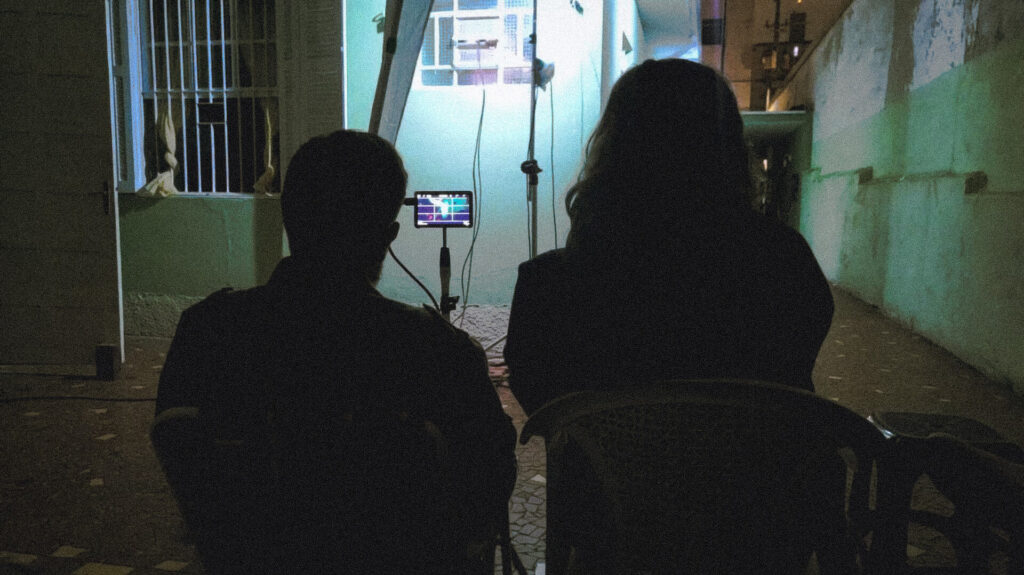
Did you have any specific influences growing up that lead you towards the film industry?
DANIEL – I grew up without a father, and my mother was what you might call a free spirit. I was raised by my grandmother and my uncle, who was an illiterate construction worker. He taught me the value of hard work. My mother, when we spent time together, introduced me to literature, poetry, music, and took me to the cinema. Some of the first films I remember watching in theaters were King Kong, The NeverEnding Story, Superman I and II, and Marcelino Pan y Vino.
I believe both my mother and my uncle played central roles in shaping who I am. My uncle showed me the importance of hard work, while my mother opened my eyes to the world of art. Those early cinema experiences sparked a deep passion for storytelling, and over time, I became increasingly drawn to the power of film as a way to explore both human emotions and imagination.
Another important experience was when, in the 90s, I started playing a role-playing game called Vampire: The Masquerade. It revolutionized my mind. It’s one of the most interesting things I’ve ever come across. I became a storyteller for chronicles based on that gothic-punk universe, and that’s when I realized what I truly loved: telling great stories. It was decisive.
What were your main responsibilities on Evil Connection?
DANIEL – I took on multiple roles throughout the production of Evil Connection. The concept came to me after receiving some scary phishing emails that made me reflect on our vulnerability in the online environment. This inspired me to develop the first pages of the story, which I shared with Adriene, a talented former student. She turned the concept into a full script, and soon after, we were fortunate enough to win a grant from the State of São Paulo.
With a modest budget, leading a team composed mainly of former students was a unique opportunity to provide them with real hands-on experience while also fostering a collaborative environment. I acted as executive producer and director, guiding both the creative and logistical aspects of the production.
Like any production, we faced the natural challenges of the creative process, but with focus and teamwork, we managed to overcome them. The commitment of everyone, especially Adriene, was crucial to the success of the project.
Receiving the award for best film was not a stroke of luck, but the result of hard work and dedication from every member of the team. This experience reinforced my belief in the power of collaboration and perseverance in filmmaking. It showed me that even with limited resources, great results can be achieved with a dedicated team and the right mindset.
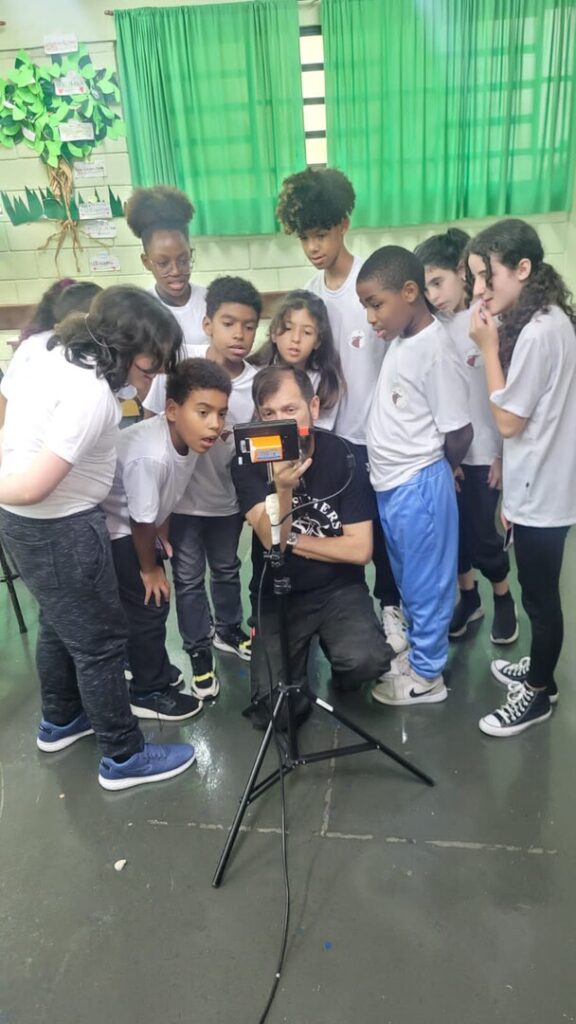
Where was the film shot?
DANIEL – The film was primarily shot in São Bernardo do Campo, where we received significant support from the city’s Department of Culture and Youth. Their collaboration was invaluable and played a crucial role in making the production possible. We also filmed several interior scenes in a private residence in São Caetano do Sul.
We are incredibly grateful to the local community for their support, as it contributed greatly to the film’s success and the recognition we received with this award.
What was the inspiration for the story?
ADRIEENE FERRERIA NOGAROTTO (Writer / Producer) – From the moment I started working on the script, I sought as much inspiration as possible from my surroundings. Some single mothers and children in my family, for example, were a great inspiration for what the characters would do, or not do, throughout the story, especially Jaiane. One moment that highlights this was when Daniel and I were wracking our brains to find a way for Jaiane to ‘destroy’ @Nu, and my mother suggested the idea of the character using a sledgehammer, because that’s what she would do if she were in Jaiane’s place. I believe this kind of thing brings a lot of truth to the story and enriches it, helping people connect with the characters.
In terms of fiction, films like Paranormal Activity 1 and 3 influenced me, especially in the opening scene of the film, where Agnes appears under the covers looking like a ‘little ghost.’ Stephen King’s IT was an inspiration for how @Nu would speak to Acácia, and it also brought the inspiration for the name of the game ‘Pop Kids.’ Hereditary, by Ari Aster, was an inspiration for the scenes that focused on the mother-daughter relationship, and the film’s musical score was a good companion during the writing process.
What was the most important thing for this project to achieve from a narrative and character standpoint?
ADRIEENE – For me, the project needed to address two essential points that reflect today’s society, and I believe it achieved that. The first is that we live in an increasingly connected world. We share more and more of our lives online, we can connect with people from different parts of the world regardless of distance… in short, there are many possibilities, which is good, but at the same time, we become very vulnerable. Especially children, who are exposed to online risks without proper supervision. The second point is the importance of a support network for single mothers, who have to juggle multiple responsibilities to work, take care of the home, raise and protect their children, while in the end, they are just one person.
These two points are connected in the narrative because, as mothers try to manage multiple responsibilities, they often lose control over what their children are doing online and what dangers they are exposed to. This creates a scenario of tension for both the mothers and the children, which is explored in the film through the difficulties the protagonist faces in protecting her daughter from invisible threats. The lack of a support network and the excess of connectivity thus become forces that challenge the characters and drive the narrative.
DANIEL – From my perspective, one of the most important goals of the narrative was to highlight how we, as a society, are increasingly exposed to risks on the internet. Every day, we face new dangers, often without realizing it, and this is something I felt was crucial to explore in the characters’ journeys.
The story of Evil Connection delves into the way our online lives are being reduced to algorithms and digital marketing techniques. This dehumanization and loss of privacy were central themes we wanted to convey, especially in how the characters interact with the digital world and how it impacts their personal lives. We wanted to show that beneath this digital façade, there is still a human element struggling to survive—a subjectivity that’s at risk of being lost.
Through the characters’ experiences, we aimed to create a narrative that forces the audience to reflect on their own relationship with technology and the digital landscape, while also delivering a story full of suspense and psychological tension.
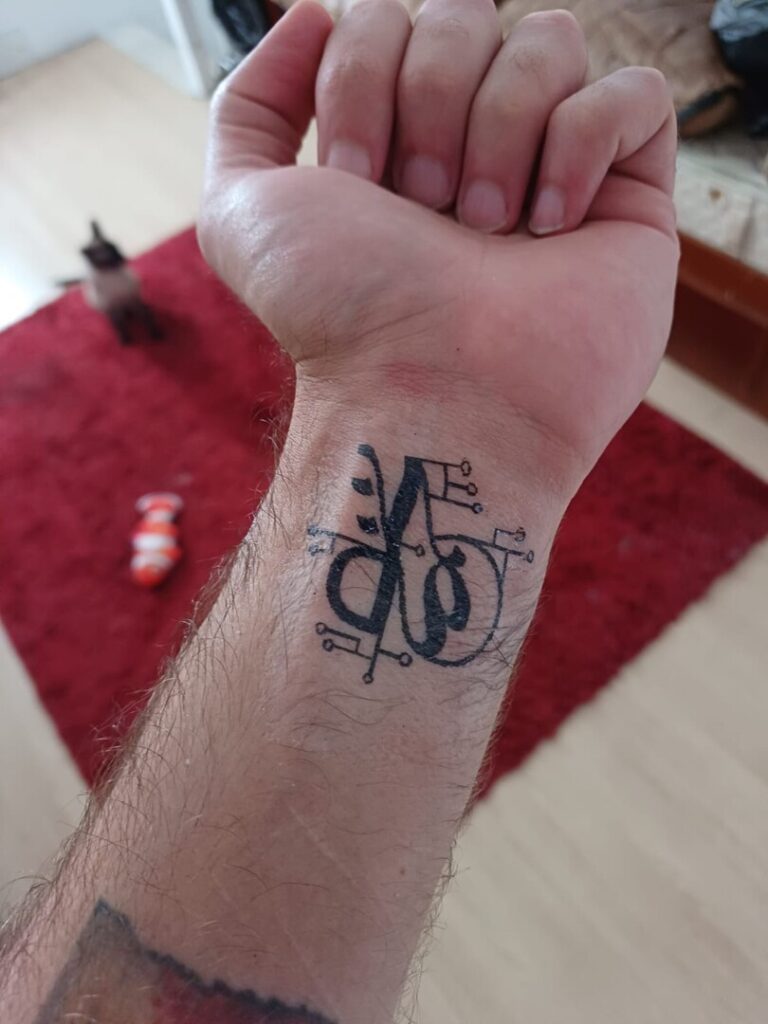

How long was the development process on the film and what was the biggest challenge moving from script to production?
DANIEL – Due to budget constraints, we had to rush some of the script rewrites during pre-production. However, this urgency led to some great creative breakthroughs. For instance, the character Renato was originally written as a police partner to Roger, which gave the film a somewhat clichéd feel of an American-style cop movie. It was during this process that we had the idea to reimagine Renato as a homeless man, which brought a unique layer of originality to the project and grounded it more in reality—not just Brazilian reality, but something universally relatable.
The timeline was tight, as the funding grant required us to complete the entire project within a year. We were very pleased with the final result, but I believe the biggest challenge in moving from script to production was refining the dialogue. Adding layers and subtext is something that, in theory, seems straightforward, but in practice, it requires a lot of skill and dedication. Developing exceptional dialogue is a challenge even for experienced writers, let alone during a rushed
production schedule.
Other than that, the process was relatively smooth, as the script was already well-structured and focused. However, our biggest hurdle came during post-production. Fortunately, the State of São Paulo, which funded the film, granted us extra time to complete the project. Post-production brought a host of challenges, particularly regarding elements that were pushed off during filming,
such as all the computer and cell phone screens, which were created entirely in post. This was a complex process, and at times, we felt it could jeopardize the film.
In the end, overcoming these challenges made the final product even more rewarding, and receiving the award for Best Film was a testament to the hard work and dedication of the entire team. It reinforced my belief that, no matter the obstacles, creativity and persistence can turn any project into something truly special.
This film contained some elaborate – and at times almost abstract sets. How did you conceptualize the sets where the real world crossed over into the electronic one? What was the biggest challenge in the design process?
VITORIA CECCON (Set Designer) – It was, at first, a very abstract work. We had a huge research process, looking for days the most variety of references: all kinds of art, movies, paintings, photography and even makeup, to get the concepts and the energy that we wanted to transmit in set design. Some of our influences were “Videodrome” (1983) and the art installation “Infinity Space” from Yayoi Kusama,
for the server’s hallway, for example. It was a great effort of all art team, we’ve made an execellent job. Then, we drew some kind of architectural plan of all sets, letting the imagination run wild, using some simbols that had the energy that we were looking for, and building it accordingly with the script, characters evolved, and the mood.
The biggest challenge was, indeed, to bring our design from paper to reality. Get to work and get things done. Make movies in Brazil is, in fact, a challenge every single time. Here we have this culture that priorizes foreigner movies, leaving national productions at a side. In this situation, we usually don’t have a lot of money or resources, so we have to improvise sometimes. It was and is
(every time) a challenge, but also my favorite part, despite the difficulties.
Can you tell us about your experience in working with your team on this project?
Working on Evil Connection was a challenging yet rewarding experience. Although most of the team didn’t have much experience and we were working with a limited budget, the majority of the crew proved to be true warriors. There were moments of stress, and some team members had to leave in difficult situations, but the core group remained resilient and committed until the very end.
Despite the typical challenges of filmmaking in Brazil, such as limited resources and a lack of infrastructure compared to other countries, the experience taught us valuable lessons. One of the most important things I learned is that, even when you don’t have all the tools at your disposal, creativity and perseverance can fill the gaps. Our team overcame these obstacles with a lot of ingenuity, and we managed to create something special from scratch.
The dedication of the team, despite the differences and pressures, allowed us to overcome every challenge and deliver a film that we are all proud of. Winning the award for Best Film is a testament to their hard work, passion, and belief in the project. It was a tough journey, but one that showed us that, no matter the circumstances, a united team can achieve great things.
Tell us a little about working on the project. What is your most memorable day of production?
VINICIUS ALBANO (Actor) – Working on this Project was very special. It was the second time I worked in a horror movie and in this kind of movie you have to imagine everything, you have to make all the fantasy become true, even in the most strange situation. I remember when, in a scene, we had to run of zombies and i thought “it looks like a child play and I liked It”.
ALEXIA ANNES (Lead Actress) – The most memorable day for me was the day of the final action scenes, it required physical preparation and also great concentration due to their dramatic nature.
What did you find most challenging?
MANUELA PRADO (Lead Actress)- The last day of recording was busy, but it was very fun and special.
ALEXIA – The scene in which I had to save my daughter from hanging.
VINICIUS – The most challenging moment was when we had shot until late of night and the next day I needed to wake up early in the morning because I had another job. On the way to this next job I thought “I’m so tired but we did a great job.
DANIEL – The most challenging aspects for me were directing such a large team while managing my two health issues, and making a genre film on a low budget. However, these challenges pushed me to find creative solutions and to trust in the strength of my team.
Working with a tight budget in the horror genre meant we had to be innovative in how we approached certain scenes, making sure we maximized the impact of every shot. My health challenges also required me to be more efficient in how I directed the team, delegating tasks when necessary and focusing on what truly mattered.
In the end, overcoming these obstacles made the project even more rewarding, and I believe that these limitations actually strengthened the film. Winning the award for Best Film is proof that, with determination and creativity, you can turn challenges into opportunities for growth and success.
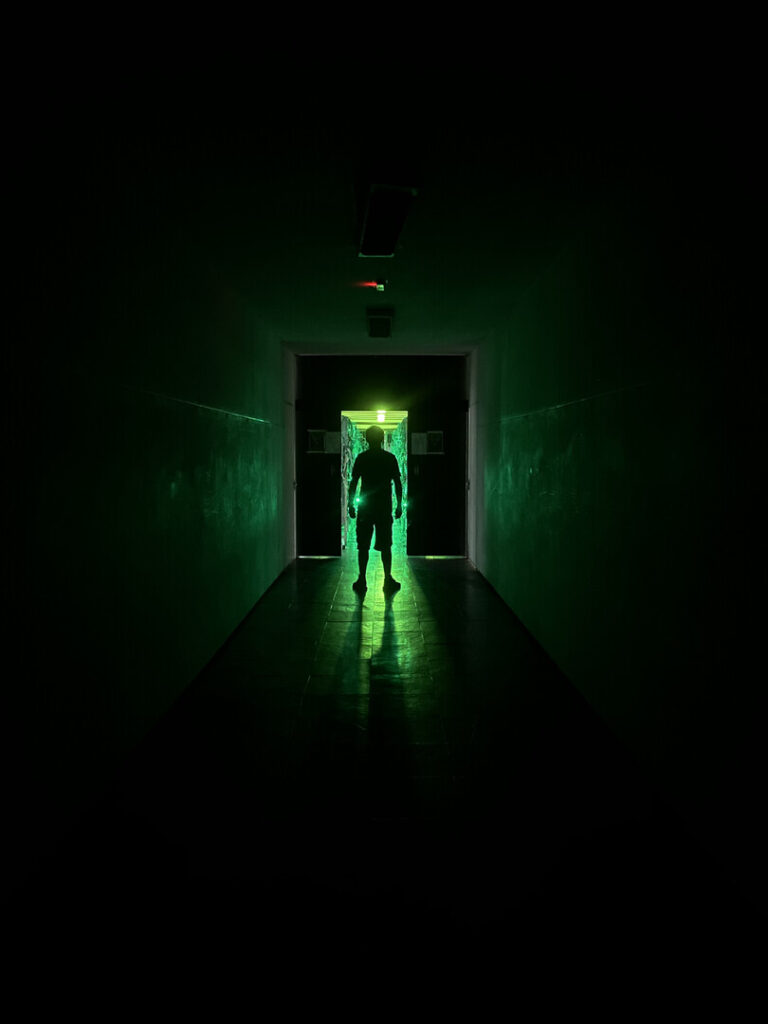
The film relies heavily on the strong performance of young Manuela Prado (who we think is fantastic!) How difficult was the casting process to find a young performer you could count on?
DANIEL – On the day of the casting, Manuela initially appeared a little nervous, which is natural for a young actor in such an important role. However, I have a habit of filming every audition and reviewing the footage later, and when I watched her performance again at home, I realized there was something truly special about her. There’s something invaluable about seeing how an actor translates on screen, and Manuela’s ability to convey vulnerability and strength really stood out to me.
She brought a unique sensitivity and depth to the role, and I knew she had the emotional range necessary to carry the film. What I appreciated most about her performance was how she grew into the character throughout the production. Her portrayal brought an authenticity that was key to the success of Evil Connection. Watching her develop and bring the character to life was a rewarding experience, not just as a director, but as someone who values discovering and nurturing new talent.
In the end, casting is about trusting your instincts and recognizing that sometimes the best performances are the ones that reveal themselves over time. Manuela’s talent was clear, and her work was essential in bringing the emotional core of the film to the surface.
What makes a film interesting for you? What are three qualities that you look for in a film?
MANUELA – A film that tells a good story. editing, good character acting and a story that makes you reflect at the end.
ALEXIA – A storyline that connects with the audience, a mystery that arouses curiosity and a great twist! I love films that surprise you!
DANIEL – That’s a challenging question because cinema is such a complex and multifaceted art form. Great filmmakers, in the broadest sense, need to juggle many elements at once to create something truly impactful. For me, I look for films that explore the darker, yet profoundly beautiful, truths of life—films that aren’t afraid to dive into the complexities of human nature. Instead of listing three specific qualities, I’ll mention three filmmakers whose work embodies what I look for in cinema. My favorite director, without a doubt, is David Fincher. His ability to combine precision, tension, and depth in storytelling is something I greatly admire. At the same time, I have immense respect for filmmakers like Tarkovsky, Buñuel, Bergman, and Haneke, all of whom explore philosophical and existential questions in their work.
In my own filmmaking, including Evil Connection, I strive to bring that same level of complexity and emotional depth to the screen. I want to create films that not only entertain but also provoke reflection, much like the works of the directors I admire. Ultimately, a great film for me is one that lingers in your mind long after it’s over, challenging you to see the world differently.
What project helped you launch your career?
ALEXIA – The first feature film that I appeared in, which was Invasion.
DANIEL – So far? Well, I’d say Conexão com o Mal is the project that has had the most impact on my career so far, especially with the recognition it has received, including winning Best Film here. While I feel like I’m still in the early stages of my journey as a filmmaker, this project has opened doors and given me the confidence to pursue new challenges.
Each film, no matter the scale, contributes to the development of my craft, and Conexão com o Mal is certainly a pivotal moment. I see it as the beginning of something bigger, and I’m excited to see where this path will take me in the future.
ADRIEENE – I believe and hope it will be Conexão com o Mal. I’m still processing the festival selections, the awards, and the media coverage. It’s all very new and has made me really happy, excited for the next projects!
What are you most proud of? Describe your biggest accomplishment to
date.
VINICIUS – For me the fact the movie is running around the world is a reason to celebrate. Of course when I see the movie I want to change somethings from my performance. But makes me proud when the team see the movie and smile.
ALEXIA – Reaching and connecting with people though my art, even if on a small scale. I have managed to reach places and a public with art that had never had this type of experienced before.
MANUELA – Os prêmios que eu conquistei nos festivais de cinema. {The awards I won at film festivals)
DANIEL – What I’m most proud of is knowing that I can truly take a film from start to finish. It may seem simple, but the process is filled with countless decisions and details. It’s fascinating to witness how something that began as an idea, then became a script, was brought to life by a talented team on set, and finally polished through an exhaustive post-production process. For me, just seeing a project completed is already a huge source of pride.
However, the fact that Conexão com o Mal has not only been completed but is also winning multiple awards, including Best Film, is a powerful recognition of the hard work and dedication of everyone involved. Seeing that initial spark of an idea turn into a fully realized, award-winning film has been incredibly rewarding. It reaffirms my belief in the power of collaboration and the magic of storytelling.
What makes it even more special is knowing that people in places I’ve never been, living lives completely different from mine, can find value in our work. That kind of international recognition is both gratifying and inspiring, and it motivates me to keep creating and sharing stories that resonate with audiences around the world.
ADRIEENE – My greatest pride is seeing the film completed and circulating around the world. From a production standpoint, it was an extremely complex process, with numerous challenges and a large team to manage. I’m very happy that, along with Daniel and the team who worked in harmony, always prioritizing the film, we were able to overcome all the obstacles and complete the project. Now, seeing everyone’s work being recognized internationally is an immense satisfaction.
What are your ambitions for the future?
DANIEL – I see myself as a storyteller with a deep passion for independent, low-budget filmmaking. There’s something incredibly satisfying about creating powerful stories with limited resources, and I’m committed to continuing on this path. We already have several projects in development and are actively seeking partnerships to bring them to life.
One of these projects, O Horror Imita a Vida, is inspired by the Italian Demons series, conceived by Dario Argento and Lamberto Bava. The story follows a film crew shooting a movie about demonic possession, but things take a dark turn when the demon escapes the narrative and begins possessing the crew, turning the set into a reall hell. We love playing with metafiction and exploring
the boundaries between fiction and reality.
Another project, Encenações do Crime, follows a criminal investigator who re-enacts a series of murders to uncover the truth behind a killer who removes the bellybuttons of his victims. The project has a strong punk-gothic aesthetic, and we’re excited to dive into that visual and narrative style.
These are just two examples of the many ideas we have in development. The recognition we’ve received for Conexão com o Mal has been incredibly motivating, opening new doors and allowing us to explore further collaborations, both locally and internationally.
One of the highlights of my experience at the Atlantis Awards was meeting Heitor Cavalheiro, a cinematographer who won in another category. We’ve already begun discussing future collaborations, and I’m excited to see where those conversations lead.
We’re also looking for international partnerships. Filming in Brazil is relatively inexpensive, and we have a unique landscape, along with an incredibly talented pool of professionals eager to create. I believe these collaborations could help us push the boundaries of independent filmmaking even further.


What are you currently working on? Do you have any upcoming projects that you’re super excited about?
ALEXIA – I am currently participating in two short horror films and producing my first musical series which is no in post-production.
What advice would you give to someone who is aspiring to enter the film industry, especially as (the same job you held on the movie)?
ALEXIA – I would recommend that people who want to enter the artistic world study, research and observe people. Save memories and moments for a future character.
MANUELA – Tenha paciência, nem tudo vai sair como nos desejamos e vamos ouvir muitos nãos, mas o sim não é impossível. (Have patience, not everything is going to turn out like we desire, and we will listen to a lot of no, but the yes is not impossible.)
DANIEL – It’s not easy, but what profession is? If you truly love what you do, it makes the hard work worth it. My advice to anyone wanting to enter the film industry is to be prepared to put in a lot of work and to face challenges head-on. The key is perseverance.
In my own experience with Conexão com o Mal, we faced numerous obstacles, from budget limitations to production setbacks, but what kept us going was our passion for storytelling and our commitment to seeing the project through. Surround yourself with people who believe in your vision and are willing to work alongside you, no matter the circumstances.
Also, don’t be afraid to take risks. Independent filmmaking is often about finding creative solutions with limited resources, so embrace that process. Be willing to learn, adapt, and constantly improve your craft. And remember that the film industry is a marathon, not a sprint. Success doesn’t come overnight, but if you remain dedicated and persistent, you will find your path.
ADRIEENE – It may sound cliché, but if you really want it, you can’t give up at the first obstacles that come up. Solve the problems and keep moving forward. Gradually, things will start to align.
Who else in your field do you look at for inspiration? Is there anyone that you think deserves more notice than they are getting?
ALEXIA – Greta Gerwig is an incredible woman and a perfect example of an artist. I think all the women in the industry deserve more credibility, work and respect.
MANUELA – A atriz coreana Kim Se-jeong. Acho que cada um que participou do projeto merece um prêmio pelo trabalho magnífico que fizeram. (The Korean actress Kim Se-jeong. I think every single person that participated in the project deserves an award for the magnific work they did.)

The film contains a tribute to Momo de Oliviera, can you share a story about her and why you chose to dedicate the film to her?
DANIEL – Momo de Oliviera was the actress who played the school principal in Conexão com o Mal. Unfortunately, she passed away after a courageous battle with cancer not long after we finished filming. Sadly, she didn’t get the chance to see the final version of the movie.
Momo was an incredibly radiant person. Despite facing such a tough battle, she always brought joy and peace to those around her. Her presence on set was uplifting—she had this rare ability to make everyone feel at ease, even in the most stressful moments of production.
Where can everyone keep up with you to learn more?
Alexia Annes
Instagram @alexiaannes
and on all other platforms
Alexia Annes
Manuela Prado
Instagram ( @manuela._.prado
Daniel Maciel
Instagram: @danny3u
And on all other platforms: Daniel Maciel
Adrieene Nogarotto
You can find me on Instagram: @adrieenefn